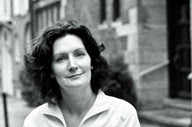In his introduction, Richard Holmes, owner of Head House Books, said that it was his mother-in-law who first discovered Mornings in Jenin in a London airport. She loved it and gave it to her daughter to read. Her daughter gave it to everyone to read including Richard. The book has been selling twice as many copies as any other book at HHB, because the staff can't stop talking about it.
Susan Abulhawa talked about how she came to write the book. She spoke about Palestinians leaving their homes in 1948, believing it was temporary, merely packing a bag for a few days away. Jewish refugees who arrived from Europe, Russia, America, etc. walked into fully furnished homes - family pictures hung on the wall, fruit bowls still overflowed on the kitchen table.
That image hung in my mind. What could have been going through the Jewish settlers' minds? They have survived through horror, traveled miles and miles to live in peace. But when they walked into these homes, didn't they think of who they were replacing? Did they feel justified because someone had done the same to their homes?
But Mornings in Jenin is not about the Jewish refugees. It is unapologetically the Palestinian story.
Some have criticized Abulhawa for being biased or unbalanced in her portrayal of the Palestinian/Israeli conflict. In her opinion, Palestinians have been made to pay for the sins of the West. Edward Said, she said, believed that the story of the Palestinians isn't heard because they are victims of history’s greatest victims: the Jews.
Abulhawa didn't start out to become a novelist. A combination of things happened. First she traveled to Jenin in 2002 following the 9 day massacre. She arrived just as the camp was opened. For two weeks, no one including the press and human rights organizations had been allowed entry. What she saw there and the stories she heard deeply affected her.
Second, shortly after she returned from Jenin, she was laid off from her job. Her experience inspired her to write create a multi-generational novel about one Palestinian family's experience. She spent four years writing Mornings in Jenin. What started out as a story of two brothers separated in 1948, one being raised Palestinian and the other raised Israeli - a story to illustrate a history of a people- became a very personal story of one family. Abulhawa's characters came alive to her and were no longer symbols of a struggle.
She read two passages from her novel. In this sweet scene, five-year-old Amal sits with her father (Baba).
I could hear the turbulence inside Baba's chest, the protests of his lungs against each inhalation of honey apple tobacco.
"Baba, who do you love more, me or Yousef?"
"Habibti," he began. I couldn't help but smile when he called me that. "I love you both the same," he said.
"How big do you love me?"
"I love you as big as the ocean and all its fishes. As big as the sky and all its birds. As big as the earth and all her trees."
"What about the universe and all its planets? You forgot that part."
"I was getting to it. Be patient," he said, puffing on his pipe. He exhaled, "And I love you bigger than the universe and all its planets."
"Do you love Yousef that much?"
"Yes. As big as the ocean . . . but without all the fishes."
My heart grew with all the fishes, the idea that Baba loved me just a little more. "What about the sky and earth? Do you love him that big but without all the birds and the trees?"
"Yes. But don't tell anyone."
"I won't, Baba, I swear." My heart swelled with the birds now. "What about the universe part?"
"Don't be greedy." He winked at me. "I have to get to work, habibti. Tomorrow."
Habibti. Tomorrow.
 Susan Abulhawa founded the organization Playgrounds for Palestine. Visit the website if you want to help.
Susan Abulhawa founded the organization Playgrounds for Palestine. Visit the website if you want to help.

Susan, thank you for this! I do hope we can get together again. I have purchased your book and looking forward to reading it this summer on the beach!
ReplyDeletehugs,
susie